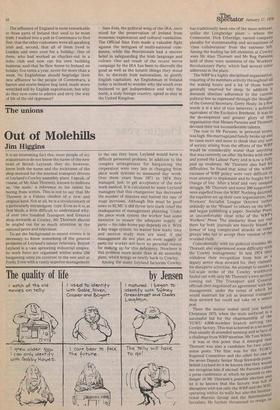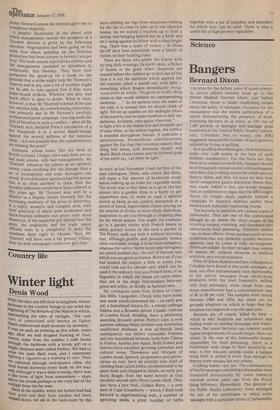The unions
Out of Molehills
Jim Higgins
It is an interesting fact that. most people of my acquaintance do not know the name of the new head of British Leyland; they do, however, know both the name and the nickname of the shop steward for the internal transport drivers at Leyland's Cowley assembly plant. I speak, of course, of Mr Alan Thornett, known to millions as, 'the mole,' a reference to his talent for boring from within. This is not to say that Mr Thornett is a Fabian thinker of a new and original kind. Not at all, he is a revolutionary of a particularly intransigent type. Even so it is, at first blush, a little difficult to understand why, of over two hundred Transport and General shop stewards at Cowley, Mr Thornett should be singled out for so much attention in the national press and television. • To set the background to recent events it is necessary to know something of the general problems of Leyland's labour relations. British Leyland is a vast sprawling industrial empire, its work force are organised within some 250 bargaining units (in contrast to the one unit at Ford). Even with a vastly superior management to the one they have, Leyland would have a difficult personnel problem. In addition to the complex arrangement for bargaining the corporation were very late in changing from piece work systems to measured day work. Over three years from 1971 to 1974 they managed, just, to get acceptance of the new work method. It is calculated by some Leyland managers that this changeover has decreased the number of disputes and halved the rate of wage increases. Although this must be good news to BLMC it did throw into stark relief the inadequacies of management planning, Under the piece work system the worker had some incentive to ensure the adequate supply of parts — his take-home pay depends on it. With a day wage system, no matter how many time and motion study men are used, if the management do not plan an even supply of parts the worker will have no personal reason for making up for this deficiency. Nowhere is this problem more acute than in an assembly plant, which brings us neatly back to Cowley.
Among the many Leyland factories Cowley
Spectator
January has traditionally been one of the more r militant,l 7 unlike the Longbridge plant — where the Communist, Dick Etheridge, earned company plaudits for statesmanship and accusations of 'class collaboration' from the extreme left. Among the leading far left elements at Cowley were Mr Alan Thornett and Mr Reg Parsons; both of them were members of the Workers' Revolutionary Party, which had several other adherents in the plant.
The WRP is a highly disciplined organisation, requiring of its members activity throughout all the waking hours and a lot of those hours generally reserved for sleep. In addition it demands absolute adherence to the current political line as expressed through the thought of the General Secretary, Gerry Healy. In a few words it is a sect of true believers, a political equivalent of the Exclusive Brethren. It was to the development and greater glory of this organisation that Messrs Parsons and Thornett devoted their not inconsiderable talents.
The cost to Mr Parsons, in personal terms, was high. His marriage_and family broke up and he came more and more to think that any sort of society arising from the efforts of the WRP would be considerably worse than anything that was currently on offer. He broke with them and joined the Labour Party and is now a fully paid up moderate. Mr Thornett also had his difficulties, he found that some of the wilder excesses of WRP policy were very difficult to even attempt to implement and he fought for a change of line. After a brief and very unequal struggle, Mr Thornett and some 200 supporters were expelled from the WRP. Nothing daunted, the expellees set up their own organisation, the Workers' Socialist League (known rather unkindly as the 'Weasel' to others on the left). and began publishing a paper, Sociali.st Press, an uncomfortably close echo of the WRP 's Workers' Press. The similarity does not end there for both journals are heavily biased ori favour of long complicated attacks on other groups who fail to accept their version of the revealed truth.
Coincidentally with his political troubles Mr Thornett also experienced some difficulty with the Cowley management. In late 1974 theY withdrew their recognition from him as a deputy senior shop steward for, they claimed, his disruptive activities. An attempt to mount a full-scale strike of the Cowley workforce fizzled out with only Mr Thornett's own section coming out. The Transport and General officials then negotiated an agreement with the management, under the terms of which he would maintain his job as internal transport shop steward but could not take on a senior post. There the matter rested until just before Christmas 1975, when the mole surfaced in a successful bid for the chairmanship of the TGWU 4,000-member branch serving the Cowley factory. This was achieved at a no moref than usually ill-attended meeting and in face o a challenge from WRP member, Mr Torn Whit
ed that
It was at this point that it emerg Thornett was also a candidate for two othe.r union posts. The first was for the TGWU Regional Committee and the other for one of the seven Deputy Senior Shop Stewards posts: British Leyland let it be known that they would not recognise him if elected. Mr Parsons called a press conference at which he pointed to the_ danger of Mr Thornett's possible erection ad, I let it be known that the factory was NO disruption with not only the WRP and the WSL operating within its wails but also the Internaal
:
tional Marxist Group and the Internationas Socialists. He further threatened to resign
Senior Steward unless the election gave rise to a moderate majority. A graphic illustration of the dread with Which management viewed the prospect of a Thornett election is given by the following anecdote. Negotiations had been going on for some time about speeding up the Princess Production line from sixteen to twenty cars per hour. The trade unions rejected the scheme and the management intended to introduce it, unilaterally, this Monday. They have now Postponed the speed-up for a week on the grounds that a strike might help Mr Thornett's Chances and in any case a lot of workers might not be able to vote against him if they were home-bound strikers. Whether this ploy had much effect is open to doubt. What is clear, however, is that Mr Thornett's defeat in his last two election bids, by overwhelming majorities, was primarily due to Mr Parsons's carefully orchestrated press campaign. Leaving aside the lack of fairation in such a conflict after all Mr Thornett with Socialist Press's circulation of a few thousands is at a severe disadvantage against the several millions of the national press — is it not possible that the commentators are missing the point?
Someone, whose name, like the head of British Leyland, I forget, once said there are no bad trade unions, only bad managements. Mr Thornett, whatever his talents as an agitator, cannot cause anything like the damage that a set of incompetent and inept managers can wreak. If revolutionary agitators had the power that is so often ascribed to them then the socialist millenium would have been ushered in fiftY years ago. Mr Thornett may well be a disaster as a Deputy Senior Steward, but the mcreasing tendency of the press to intervene, in a highly sensitive and complex area, with their portrayal of simon pure moderates and black-hearted militants can prove even more disastrous. If the suspicion got abroad that the Press, the employers and the trade union Officials were in a conspiracy to deny the members their right to choose, then Mr Thornett will have won a far greater victory than his little newspaper could ever give him.



























 Previous page
Previous page